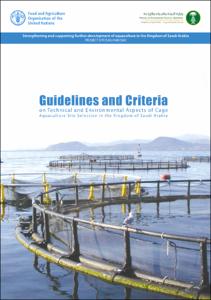Guidelines and Criteria on Technical and Environmental Aspects of Cage Aquaculture Site Selection in the Kingdom of Saudi Arabia.

View/
Average rating
votes
Date
2017Author
Cardia, Francesco
Ciattaglia, Alessandro
Corner, Richard Anthony
Status
PublishedPages
55pp.
Metadata
Show full item recordAbstract
Aquaculture and more specifically marine aquaculture is a growing industry that currently supplies
approximately 50 percent of the world’s global fish market. This will certainly continue with an anticipated
global increase in production of 30 million tonnes required by 2050 to provide fish products to a growing
population globally. FAO indicates that Mariculture, growing fish in the sea, will be the major sub-sector of
this industry to expand in to the future. The marine environment offers an available resource and provides
space for expansion, even recognising competing needs.
The Kingdom of Saudi Arabia has two coastlines, in the west the Red Sea and in the East the Arabian Sea.
The KSA is expected to expand Mariculture primarily in the Red Sea and it is on this premise that these
guidelines and (where relevant and available) criteria have been developed. Much of the detail, however,
is generally applicable and may equally apply to all KSA coasts.
Expansion and long-term s.....
Resource URL
http://www.fao.org/3/i6719e/i6719e.pdfPublisher
Food and Agriculture Organization of the United Nations (FAO)Rome, Italy
Document Language
enSustainable Development Goals (SDG)
14.2Essential Ocean Variables (EOV)
N/ASpatial Coverage
Saudia ArabiaISBN
978-92-5-109600-0Citation
Cardia, F., Ciattaglia, A. and Corner, R.A. (2017) Guidelines and criteria on technical and environmental aspects of cage aquaculture site selection in the Kingdom of Saudi Arabia. Rome, Italy, Food and Agriculture Organization of the United Nations and Ministry of Environment, Water and Agriculture in the Kingdom of Saudi Arabia, 55pp. DOI: http://dx.doi.org/10.25607/OBP-1548Collections
 Repository of community practices in Ocean Research, Applications and Data/Information Management
Repository of community practices in Ocean Research, Applications and Data/Information Management